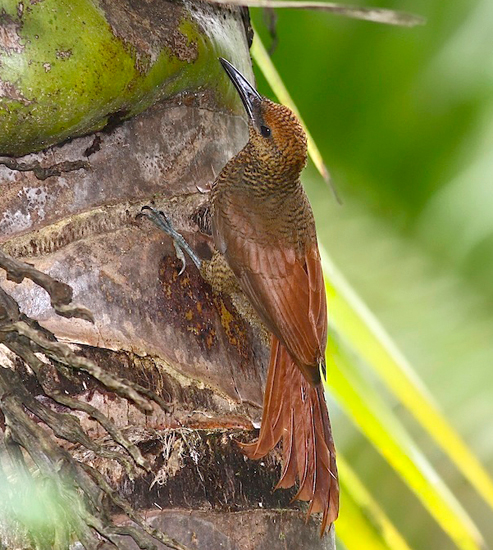(All sections now started. References updated. Incomplete gone) |
|||
| (6 intermediate revisions by 5 users not shown) | |||
| Line 1: | Line 1: | ||
| − | + | [[Image:Northern Barred WoodcreeperSJ.jpg|thumb|550px|right|Photo by {{user|Stanley+Jones|Stanley Jones}}<br />Guanacaste Province, [[Costa Rica]], November, 2011]] | |
| − | + | ;[[:Category:Dendrocolaptes|Dendrocolaptes]] sanctithomae | |
| − | [[Image: | ||
==Identification== | ==Identification== | ||
| + | 25–29 cm<br /> | ||
| + | A fairly large rusty-brown bird with a thick, all dark bill. | ||
| + | |||
| + | Sexes similar. | ||
| + | ====Similar Species==== | ||
| + | The Northern Barred-Woodcreeper is separated from the other, similar-looking woodcreepers by the strong, black barring on the back, face, and underside. | ||
==Distribution== | ==Distribution== | ||
| − | [[Mexico]], [[Colombia]], [[Venezuela]] and [[Ecuador]] | + | [[Central America|Central]] and [[South America]]<br /> |
| + | '''Central America''': found in [[Mexico]], [[Guatemala]], [[Belize]], [[El Salvador]], [[Honduras]], [[Nicaragua]], [[Costa Rica]], [[Panama]]<br /> | ||
| + | '''South America''': [[Colombia]], [[Venezuela]] and [[Ecuador]] | ||
==Taxonomy== | ==Taxonomy== | ||
Formerly lumped with the [[Amazonian Barred Woodcreeper]] and known as the Barred Woodcreeper. | Formerly lumped with the [[Amazonian Barred Woodcreeper]] and known as the Barred Woodcreeper. | ||
| + | ====Subspecies==== | ||
| + | There are 4 subspecies<sup>[[#References|[1]]]</sup>: | ||
| + | *''D. s. scheffleri'': | ||
| + | :*Pacific slope of south-western [[Mexico]] (Guerrero and Oaxaca) | ||
| + | *''D. s. sanctithomae'': | ||
| + | :*Southern Mexico (Veracruz) to northern and western [[Colombia]] | ||
| + | *''D. s. hesperius'': | ||
| + | :*Pacific slope of south-western [[Costa Rica]] and adjacent western [[Panama]] | ||
| + | *''D. s. punctipectus'': | ||
| + | :*Northern [[Colombia]] and north-western [[Venezuela]] (Zulia and n Mérida) | ||
==Habitat== | ==Habitat== | ||
| + | Humid lowland forest, open disturbed dry tropical forest. Observed at heights between 30 m and 622 m. | ||
==Behaviour== | ==Behaviour== | ||
| + | ====Diet==== | ||
| + | Their main diet consist of grasshoppers, beetles and cockroaches. | ||
| + | ==References== | ||
| + | #{{Ref-Clements6thAug14}}#Avibase | ||
| + | #Handbook of the Birds of the World Alive (retrieved February 2015) | ||
| + | #BF Member observations | ||
| + | {{ref}} | ||
==External Links== | ==External Links== | ||
{{GSearch|Dendrocolaptes+sanctithomae}} | {{GSearch|Dendrocolaptes+sanctithomae}} | ||
| − | [[Category:Birds]][[ | + | [[Category:Birds]] [[Category:Dendrocolaptes]] |
Latest revision as of 00:02, 11 February 2015
- Dendrocolaptes sanctithomae
Identification
25–29 cm
A fairly large rusty-brown bird with a thick, all dark bill.
Sexes similar.
Similar Species
The Northern Barred-Woodcreeper is separated from the other, similar-looking woodcreepers by the strong, black barring on the back, face, and underside.
Distribution
Central and South America
Central America: found in Mexico, Guatemala, Belize, El Salvador, Honduras, Nicaragua, Costa Rica, Panama
South America: Colombia, Venezuela and Ecuador
Taxonomy
Formerly lumped with the Amazonian Barred Woodcreeper and known as the Barred Woodcreeper.
Subspecies
There are 4 subspecies[1]:
- D. s. scheffleri:
- Pacific slope of south-western Mexico (Guerrero and Oaxaca)
- D. s. sanctithomae:
- Southern Mexico (Veracruz) to northern and western Colombia
- D. s. hesperius:
- Pacific slope of south-western Costa Rica and adjacent western Panama
- D. s. punctipectus:
Habitat
Humid lowland forest, open disturbed dry tropical forest. Observed at heights between 30 m and 622 m.
Behaviour
Diet
Their main diet consist of grasshoppers, beetles and cockroaches.
References
- Clements, J. F., T. S. Schulenberg, M. J. Iliff, D. Roberson, T. A. Fredericks, B. L. Sullivan, and C. L. Wood. 2014. The eBird/Clements checklist of birds of the world: Version 6.9., with updates to August 2014. Downloaded from http://www.birds.cornell.edu/clementschecklist/download/
- Avibase
- Handbook of the Birds of the World Alive (retrieved February 2015)
- BF Member observations
Recommended Citation
- BirdForum Opus contributors. (2024) Northern Barred Woodcreeper. In: BirdForum, the forum for wild birds and birding. Retrieved 26 May 2024 from https://www.birdforum.net/opus/Northern_Barred_Woodcreeper




